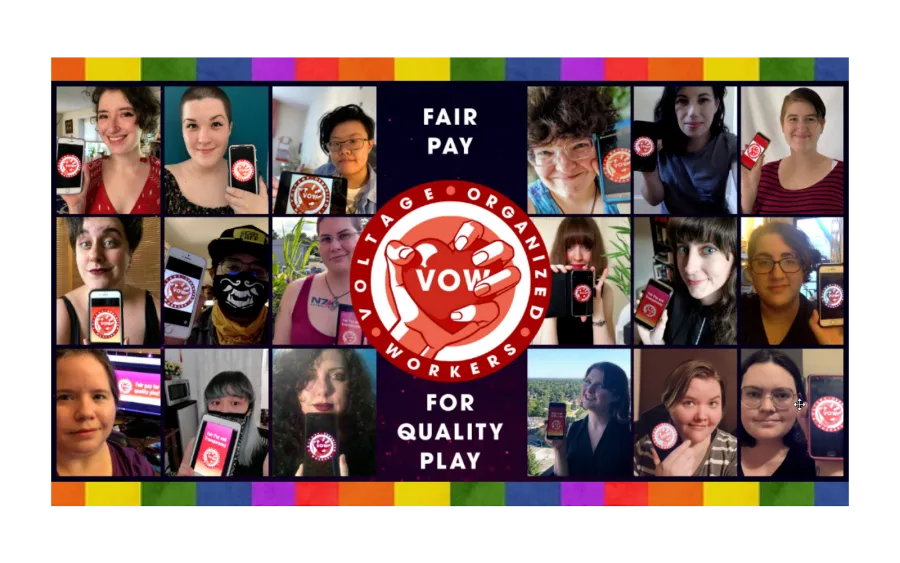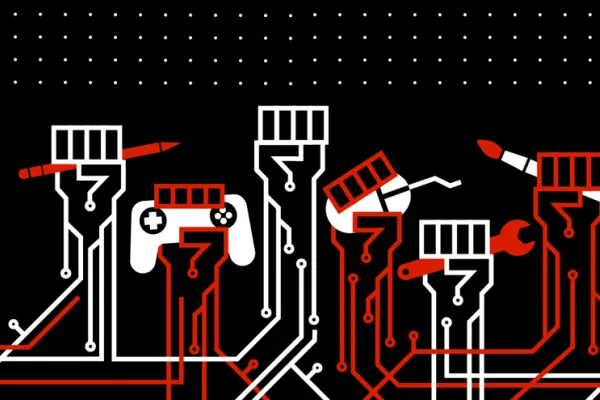Historic Win for Game Development Workers: Lovestruck Game Writers Win Fair Pay

In the wake of a groundbreaking 21-day strike, writers for Lovestruck, a mobile game produced by Voltage Entertainment USA, will return to work after negotiating pay increases averaging 78% and increased transparency at work. The workers chose to strike even though, as independent contractors, their action was not protected under U.S. labor law. Despite the risk, they prevailed through a strategic organizing effort that united the writers behind a shared set of concerns.
All 21 workers are women, nonbinary, and/or LGBTQIA and write romantic interactive fiction. The workers have only met virtually and approached CODE-CWA early on to seek help in their efforts to improve their working conditions before the strike. After management rejected the demands they presented on July 13, the workers began what would become the first successful game worker strike in the history of the game development industry.
Workers launched Voltage Organized Workers at the start of the strike, July 15, and used their social media platform to inform fans of Lovestruck: A Voltage Visual Romance Game Portal of the strike and their demands. On July 22 workers shared a community petition and over 4,000 fans signed on to demand that Voltage Entertainment USA provide fair pay to Lovestruck game writers. In a further illustration of the incredible support for the writers, fans raised a total of $7,723 for the Voltage Organized Workers Support Fund.
On Tuesday, August 4, the company and workers agreed to new terms of work. As a result of the strike, the writers will be more fairly compensated for their work, with pay increases ranging from 66% to 94%. This accomplishment was only possible through the incredible organizing and solidarity displayed by workers and support from fans.
Frances Maples, one of the striking workers said, "For me, this strike stopped being about my own pay a long time ago. It became about my coworkers and the camaraderie between us. I want all the best things in the world for all of them."
Dayna Smith shared the following on the unique position of digital workers, "As a writer, I'm already given to bouts of hermit-like behavior, which kept me from realizing just how isolating the job is for all digital workers. Getting in touch with my fellow writers assured me--and all of us--that we're never alone. Bonding hardcore through lifting each other up in the strike has easily been one of the most rewarding experiences of my life--tough, but extremely satisfying.”
"I can't overstate how important it is to trust each other and fight for each other, even when you sometimes butt heads. The sheer depth and breadth of talent and passion in this group has changed and challenged me fundamentally as a person," said an anonymous worker.
"For me, this strike was never about what I could get out of it, but rather for the improvement of conditions and pay for my fellow workers. Getting to form the bonds and friendships that we have has been a bonus, and the fact that we have held space for each other when things got intense or emotional, or when we were all getting tired, really made a difference. That, for me, is what collective action is all about," shared an anonymous worker.
"It was clear to me from the beginning that we'd need to form a united front in order to bring about the changes that needed to happen. I had no idea when we started how true that would turn out to be,” said Abby Laughlin. “Standing up for one another, sharing our perspectives, knowing that others are ready and willing to take part of the load when you need to set it down for a while... the strength that comes out of that is incredible, and I wouldn't trade the community we've formed for anything.”
On the comradery forged through the strike, Ash Barnes shared, "I went into this strike with the hopeful goal of reaching a point where all the writers would be paid what we're worth. This process has not only helped us achieve that goal, but has also woven a support network for me I never could have imagined. Now I know my colleagues not just by face and name, but by their passions, their strengths, their courage, and finding this community has been worth every tense moment, every late-night effort.”
Emma Kinema, Campaign Lead CODE-CWA said, "As a former game worker, working with the writers was a deeply meaningful and personal affair. I know what it's like to be a woman, to be transgender, and to be queer in the game industry, and at times it can be a challenging experience. I am so proud of every single one of the writers, and I am not at all surprised by the profound strength and sheer courage they demonstrated during their three week strike; their strength is characteristic of all the women, LGBTQ folks, and friends of color I've known in the industry."
###
The Campaign to Organize Digital Employees (CODE-CWA) is an initiative by the Communications Workers of America (CWA) supporting workers’ organizing efforts in the technology and game industries.
CODE-CWA Newsletter: February 21, 2025

